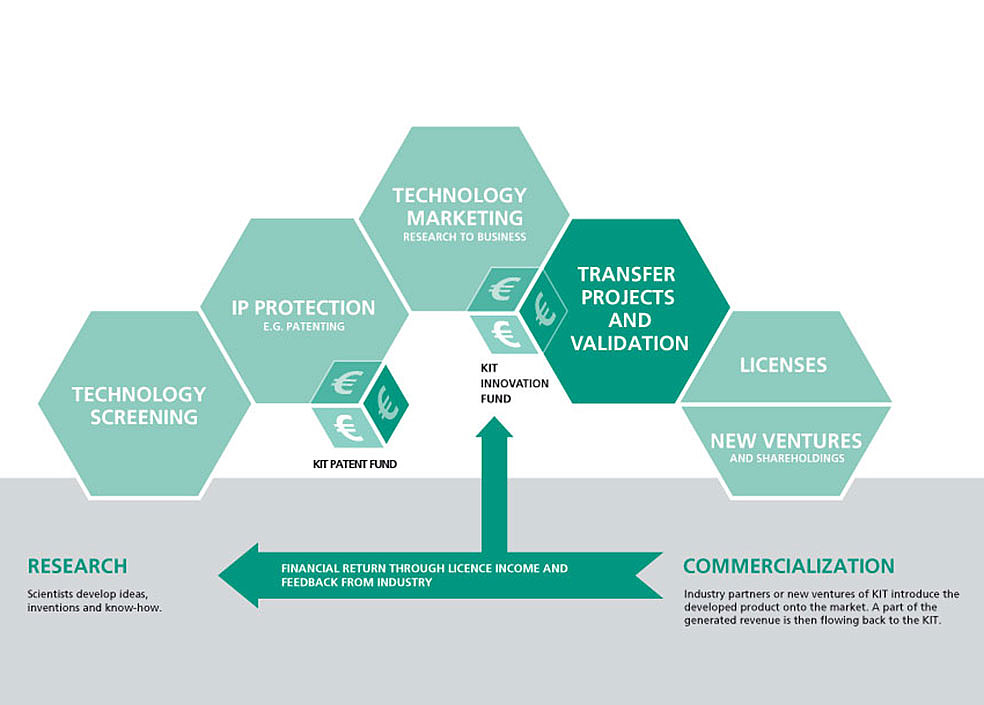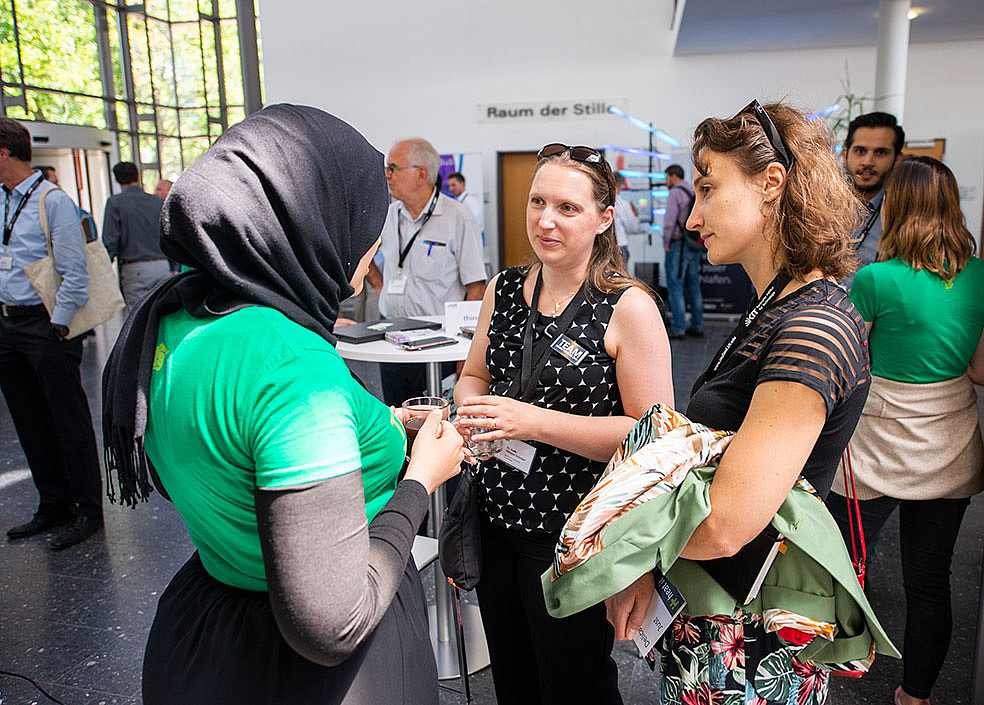Published on August 11, 2020
Technology commercialization from home office – How Corona influences technology transfer at KIT
More on Technology Transfer at KIT

We talked to the KIT innovation managers to learn more about the work situation and personal impressions. Dr. Rainer Körber is one of the three innovation managers at KIT and mainly responsible for the support of national and international technology transfer projects. Dr. Aude Pélisson-Schecker is innovation manager in the energy sector and has many years of experience in consulting and support of technology cooperations. In the field of mobility, Christopher Kling supports inventors and industrial partners in the exploitation of technology.
How has your work as an innovation manager changed since the lockdown in March? How have you adapted to the unforeseen situation?
Aude Pélisson-Schecker: With the move to the home office and the absence of on-site appointments and trade fairs, digital tools have naturally become even more important. I think it will change work processes in the long term, with more video calls and online events and new digital networking formats. It was also the right time for me to try my hand at the paperless office. In the future I will be able to work on the move at any time. As a mother, I was additionally challenged during the school and daycare closures. I was forced to massively reduce my working hours or to change my schedule, which made it much more difficult to make contact, find appointments and exchange ideas with colleagues. In other words, my sales activities were significantly reduced. However, I tried to use the time sensibly for conceptual tasks, process optimization and preparation work.
Christopher Kling: I'm new to the team this year. For me it was no big problem to switch from analogue to digital, because the technical means made it possible. With laptop and telecom equipment, my home office became a temporary office. I quickly developed an office feeling, so that over time the boundaries between job and private life became blurred. So, I first had to develop my own strategy for myself in order to maintain the work-life balance. I had planned to visit several trade fairs in the summer, but these were gradually cancelled. Occasionally, the organizers created digital alternatives, such as online cooperation exchanges, with which I am now gaining my first experience.
Rainer Körber: For me, working has already changed a bit. I am a haptic, analog type. Especially with important documents, such as drafts of license agreements, it simply reads and comments better on printed paper. I did without this in my home office and had to change over. But I have learned to appreciate the flexibility I gained by working from home. Especially in projects with foreign partners I was able to organize the communication between different time zones better than before due to flexible working hours.
How is the project support, but also the establishment of contacts to potential cooperation partners?
Aude Pélisson-Schecker: People have become accustomed to working systematically with internal and external contacts via video conferences. Although the inhibition threshold is lower, especially for the first contact with companies, the resulting commitment is certainly also lower. Regardless of this, I have tried to work more sensitively than usual, as it is impossible to know a priori who is particularly hard hit by Corona, whether on a private or professional level. This makes the "digital" contact even more sensitive.
Christopher Kling: Yes, the fast initialization is a great advantage. IT technology offers solutions to make digital professional communication work. But it's also important that people can meet again. Within KIT, meetings in smaller groups are now possible again. Thus, coordination with scientists and inventors is actually going very well. Here, the laboratories, which are closed due to corona conditions, are of benefit to us in part because, when research work is at rest, there is more time for organizational questions - for example, to deal more intensively with exploitation perspectives.
What effects does digital communication have on the formation of relationships, which is so important for cooperation negotiations?
Rainer Körber: Even if communication and organization is maintained by digital tools, the formation of relationships via purely digital channels is not as satisfactory as I would like. A large part of my work, or rather the success of technology exploitation, is based on maintaining contacts and personal networks. Here I have noticed an essential change to analogue networking. But you have to differentiate between existing contacts, which you support during product development, and the acquisition of new industrial partners. Instead of a business trip for a status meeting, online project meetings, where an agenda can be purposefully worked through, are now more practical and actually more time efficient. However, this form of efficiency is of less use when initiating projects and establishing interpersonal relationships. In the worst-case scenario, due to insufficient data transfer, you will initially only get to know each other by telephone and have 'only' a LinkedIn profile of the person you are talking to. You simply lack the feeling for people and for the togetherness. Winning someone over to an idea and sparking motivation only works in a very limited way digitally. After such a telephone meeting, you are often left with the question whether you have made any progress at all.
Christopher Kling: I couldn't agree more. The quantity of contacts is increasing at the moment, but non-verbal communication is missing on the digital way or at least not equivalent to a personal meeting. Apart from this shortcoming, one often has the feeling that companies are fighting on completely different fronts. On some occasions, contacts have stalled because company representatives could not be invited to KIT to demonstrate the technical solutions live. This is a huge disadvantage for the initiation of new cooperations. This is only now slowly starting up again and I am very happy about that.
Where do you see the biggest cuts in cooperation with industry?
Rainer Körber: For me, project initiation means working towards a cooperation agreement and thus towards a common understanding. The necessary contract negotiations, in which both parties first define their own goals and conditions, have a completely different character online and the approach takes place on a completely different level. In contrast to personal negotiations, conflicts of interest can be resolved less well online. And the goal of finding a good common basis in the form of a consensus is often reduced to a (more or less good) compromise. Unfortunately, Corona has also put projects on hold for an indefinite period of time and delayed completion. This means a severe cut for our work.
Technology transfer projects usually involve the product development of hardware, which takes place in the laboratories and workshops at KIT or at the industrial partner. The involuntary absence from the usual workplace was often difficult for both sides - science and industry. This lockdown of the development led to considerable time delays and even conflicts, to which I, too, had to react during project support. While in Germany there is still a “common sense” to these cuts, as it were, a lack of understanding is sometimes encountered internationally. The time lag of the infection peaks in the different countries plays a big role in this: While in China, for example, the four-week lockdown was already in February, in Germany it only started in March and continues until today.
The effects of the corona crisis are far-reaching and difficult to predict at this stage. How do you assess the willingness to invest and thus the chances for successful technology transfer in the coming years?
Rainer Körber: Looking into the future is very difficult. Depending on the global impact of the review, the industry could suffer a massive slump. The low point has not yet been reached. It is uncertain to what extent companies will then seize the opportunity to swim ahead again through innovation and invest in new developments. We are using the time and working intensively to generate new contacts and initiate cooperation. But it could also mean a slump in technology transfer. But people are certainly creative during the crisis. New and interesting ideas are emerging that were only born through Corona: For example, disinfection with UV rays instead of liquid disinfectant. New opportunities thus emerge from every crisis.
Aude Pélisson-Schecker: The Corona crisis represents an enormous financial challenge for politics and society to support the economy. At the beginning of the pandemic, the priority was certainly not innovation. Personally, I very much hope that everyone will now seize the opportunity to speed up the energy turnaround and combat the climate crisis. Politicians should do more to create the necessary framework conditions and point the right direction. Companies and KIT are already working hand in hand to further develop the most sensible technical solutions as quickly as possible and implement them in products, processes, or services. Have courage and act. We are happy to help!
The interview was conducted by Karola Janz



comments about this article
No comments